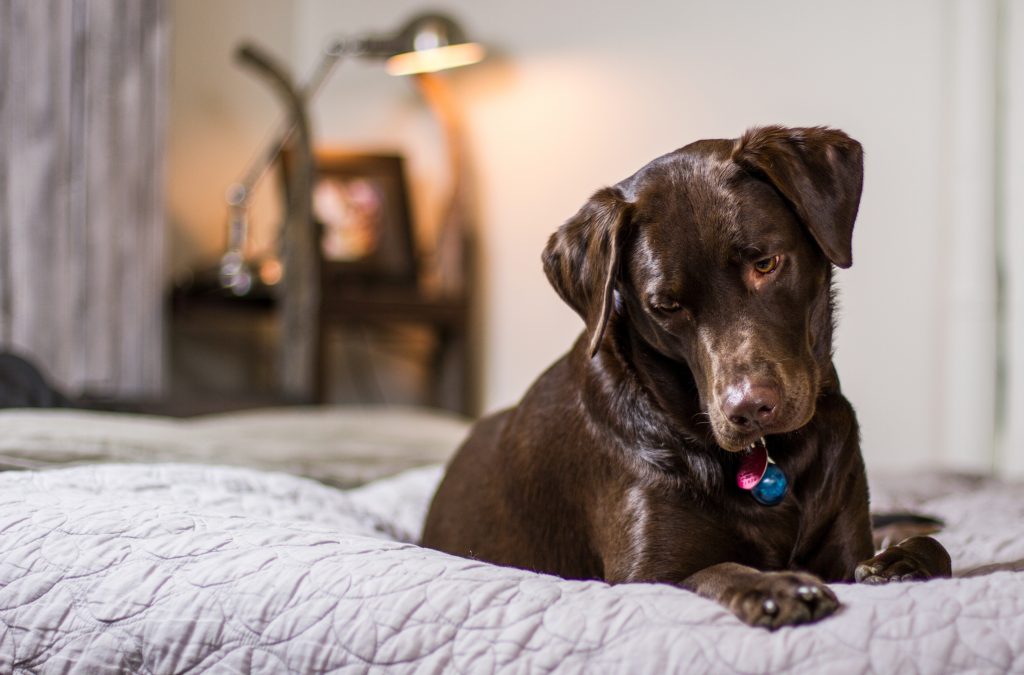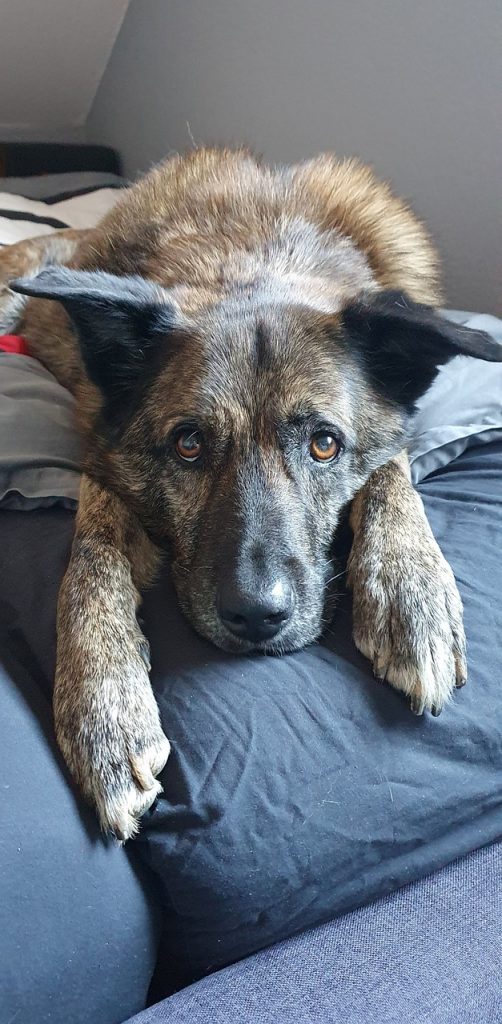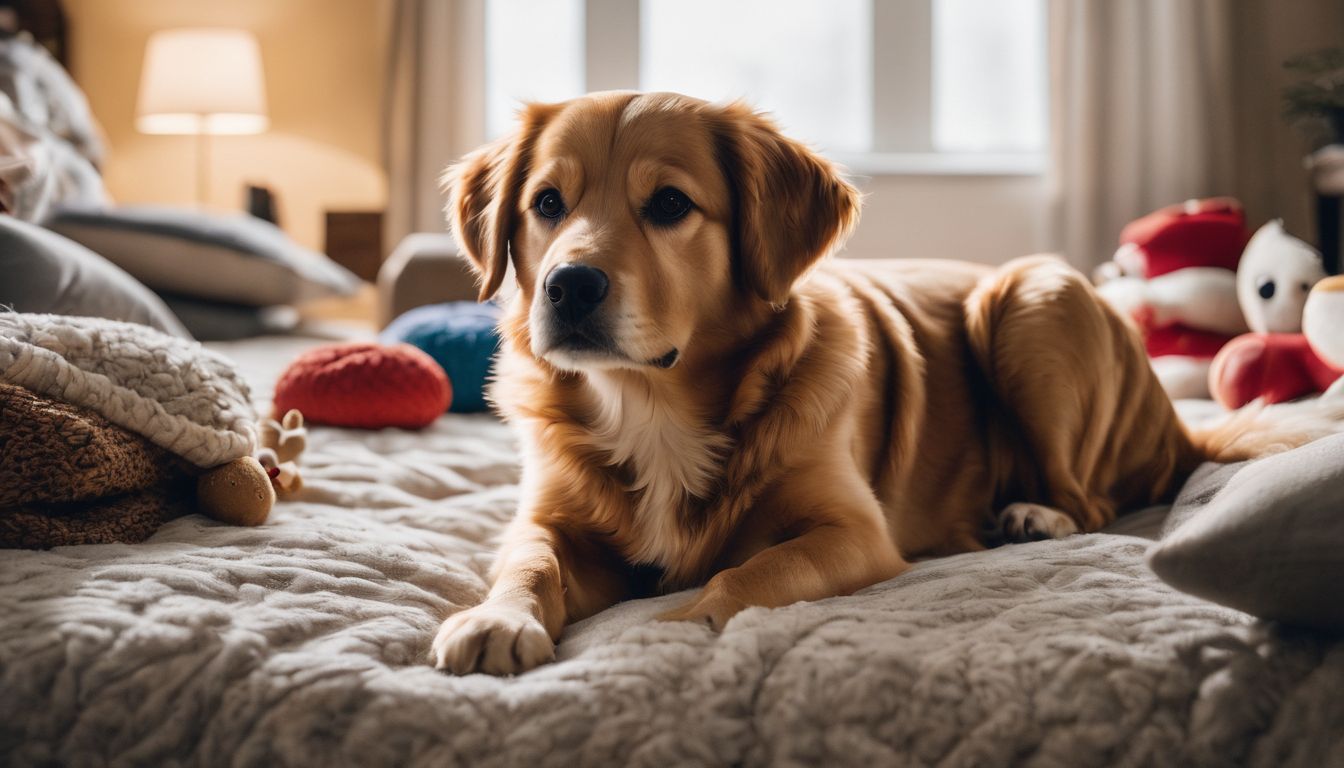Ever wondered why do dogs lick their bed? This might surprise you, but it’s actually a common behavior among our furry friends. Our blog post will delve into the potential reasons behind this habit – ranging from scent marking to stress relief – and offer practical solutions to help curb excessive bed-licking.
Curious yet? Let’s dive right in and decode this doggy mystery!

Key Takeaways
- Dogs lick their beds for various reasons, such as scent marking, finding tasty materials, anxiety or boredom.
- Excessive bed licking can be a sign of underlying health issues or lack of mental and physical stimulation.
- To address excessive licking, it’s important to treat any underlying health problems, provide mental and physical stimulation through activities and training, use positive reinforcement techniques, and create a comfortable environment.
- If excessive licking persists or there are changes in behavior or health, consult with a veterinarian for further assistance.
Reasons Why Dogs Lick Their Beds
Dogs lick their beds due to scent marking and territory, tasty bed materials, anxiety and stress, boredom and under stimulation, as well as allergies and other health problems.
Scent marking and territory
Dogs use their scent to mark places. This is a way to tell other dogs that this is their space. Your dog can also do this with its bed. The licking puts the dog’s smell on the bed.
Other dogs then know not to go near it. Dogs have a strong sense of smell and love things with their own scent.
Tasty bed materials
Dogs may lick their beds because they find tasty things on them. Some dogs keep chews or treats in their beds, so they lick it to find those yummy things. They might also like the taste and smell of the bed materials itself.
But why exactly dogs enjoy licking their beds and what makes it so delicious is still unknown. Research is needed to understand this behavior more completely.
Remember, if your dog excessively licks their bed even after you remove any tasty items, there might be other reasons behind it that should be investigated.
Anxiety and stress
Anxiety and stress can be another reason why dogs lick their beds excessively. Just like humans, dogs can also experience anxiety and stress in certain situations. When they feel anxious or stressed, licking can provide them with comfort and a sense of security.
Dogs may lick their beds as a way to self-soothe and release endorphins that make them feel better. It’s important to understand the underlying causes of your dog’s anxiety or stress to address this behavior effectively.
Providing a calm and comfortable environment, offering mental and physical stimulation, and using positive reinforcement training techniques can help reduce anxiety-related bed licking in dogs.
Boredom and under stimulation
Dogs may lick their beds out of boredom or when they’re not getting enough mental and physical exercise. When dogs don’t have enough to do, they can start engaging in repetitive behaviors like licking their beds.
This behavior helps them cope with the lack of stimulation and can become a habit over time. It’s important for dog owners to provide plenty of opportunities for play, exercise, and mental enrichment to prevent their dogs from becoming bored and seeking comfort in bed licking.
To address boredom and under stimulation, it is essential to provide your dog with daily activities that stimulate them both mentally and physically. Engaging in interactive playtime, going for walks or runs, or providing puzzle toys can keep your dog entertained and mentally stimulated throughout the day.
Training sessions can also be beneficial as they challenge your dog’s mind while strengthening the bond between you.
Additionally, creating a structured routine that includes regular exercise breaks and interesting environments can help alleviate boredom. Introducing new experiences such as trips to the park or playdates with other friendly dogs can also provide much-needed variety in your dog’s life.
Allergies and other health problems
Some dogs lick their beds excessively due to allergies or other health problems. Allergies can cause itchiness and discomfort, leading dogs to lick their beds as a way to find relief.
Other health issues like skin infections or gastrointestinal problems may also trigger excessive licking behavior. If your dog is constantly licking their bed and showing signs of discomfort, it’s important to consult with a veterinarian.
They can help identify any underlying health issues and provide appropriate treatment.

Understanding and Addressing Excessive Licking
To address excessive licking, it is important to treat any underlying health issues, provide mental and physical stimulation, use positive reinforcement training, and create a comfortable and calming environment.
Treating underlying health issues
To help your dog stop excessive licking of their bed, it’s important to address any underlying health issues they may have. Here are some ways you can do that:
- Consult with a veterinarian: If you notice your dog is licking their bed excessively, it’s important to schedule a visit with your vet. They can examine your dog and determine if there are any medical conditions causing the behavior.
- Treat allergies: Allergies can cause itching and discomfort, leading to excessive licking. Your vet may recommend allergy testing or prescribe medication to alleviate symptoms.
- Address gastrointestinal problems: Digestive issues can also contribute to excessive licking. Your vet may suggest changes in diet or prescribe medication to improve your dog’s gastrointestinal health.
- Provide dental care: Dental problems can lead to discomfort, prompting dogs to lick their beds more often. Regular dental cleanings and good oral hygiene practices can help prevent dental issues.
- Manage pain or discomfort: Dogs with chronic pain or physical discomfort may turn to excessive licking as a way of coping. Your vet may recommend pain management strategies or other treatments for these conditions.
Providing mental and physical stimulation
To prevent excessive bed licking in dogs, it’s essential to provide them with mental and physical stimulation. Here are some ways to do that:
- Play interactive games: Engage your dog in activities like fetch, tug-of-war, or hide-and-seek to keep them mentally stimulated and physically active.
- Puzzle toys and treat dispensers: Use puzzle toys or treat dispensers that require your dog to work for their food. This helps stimulate their brain and keeps them entertained.
- Training sessions: Regular training sessions not only teach your dog new skills but also provide mental stimulation. Use positive reinforcement techniques to make the training enjoyable for them.
- Daily walks: Take your dog on daily walks to provide physical exercise and mental stimulation through exploring different environments and encountering new smells.
- Enrichment activities: Set up enrichment activities such as scavenger hunts or sensory games that engage your dog’s senses and challenge their problem-solving abilities.
- Rotate toys: Keep a variety of toys available for your dog and rotate them regularly to prevent boredom. This keeps their interest levels high and prevents bed licking out of boredom.
Using positive reinforcement training
You can encourage your dog to stop licking their bed by using positive reinforcement training. This method focuses on rewarding desired behavior rather than punishing unwanted behavior. Here are some ways to implement positive reinforcement training when addressing excessive licking:
- Reward alternative behaviors: When you notice your dog has stopped licking their bed, immediately praise and reward them with a treat or verbal praise. This will help reinforce the idea that not licking their bed is a desirable behavior.
- Provide distractions: If you see your dog starting to lick their bed, redirect their attention to a toy or interactive puzzle feeder filled with treats. By offering an alternative activity, you can divert their focus away from licking.
- Teach the “leave it” command: Train your dog to understand and respond to the “leave it” command. When they start licking their bed, give the command and reward them when they stop and listen to you.
- Use clicker training: Clicker training involves using a clicker device that makes a distinct sound followed by giving treats as positive reinforcement for good behavior. You can use this technique to mark the moment your dog stops licking the bed and then reward them right away.
- Seek professional guidance if needed: If your dog’s excessive licking persists despite your efforts, consider seeking assistance from a professional dog trainer or behaviorist who can provide more tailored advice and strategies.
Creating a comfortable and calming environment
To help address excessive licking of their bed, it’s important to create a comfortable and calming environment for your dog. Make sure they have a cozy and clean bed that suits their size and breed.
Consider using bedding materials that are soft, durable, and easy to clean. Providing a designated space for your dog’s bed can also help them feel secure and relaxed. Additionally, you can use soothing scents like lavender or chamomile in the area where your dog sleeps to promote relaxation.
Finally, keeping a consistent routine with regular feeding times and exercise can help reduce stress and provide mental stimulation for your furry friend.
By creating a comfortable and calming environment for your dog’s bed, you can help them feel more at ease and potentially reduce excessive licking behavior. Remember to monitor their behavior closely and consult with your veterinarian if the licking persists or if you notice any changes in their health or well-being.

When to Seek Veterinary Assistance
If your dog is engaging in excessive and persistent bed licking, showing changes in behavior or health, displaying signs of discomfort or pain, or experiencing a negative impact on their quality of life, it’s important to seek veterinary assistance.
Learn more about addressing this behavior for the well-being of your furry friend.
Excessive and persistent licking
Excessive and persistent licking is when your dog licks their bed excessively, to the point where it becomes a problem. This can be a sign of an underlying issue, such as anxiety, stress, or even a medical condition.
Dogs may also lick their beds if they are bored or under-stimulated. It’s important to address this behavior and find ways to provide mental and physical stimulation for your dog. If you notice excessive licking, changes in behavior or health, discomfort or pain signs in your dog, it’s best to consult with your veterinarian for further assistance.
Avoiding wrap-up: Understanding why dogs engage in excessive and persistent licking is crucial so that we can address the issue effectively and ensure our furry friends live happy and healthy lives.
Changes in behavior or health
If you notice any changes in your dog’s behavior or health, it’s essential to pay attention. Excessive and persistent licking of the bed can be a sign that something is not right. It could indicate underlying medical issues like allergies or gastrointestinal problems.
Additionally, if your dog becomes more anxious, stressed, or exhibits signs of discomfort or pain while licking their bed, it may be time to seek veterinary assistance. Remember, as a responsible pet owner, it’s crucial to ensure your dog’s well-being and quality of life by addressing any changes in their behavior or health promptly.
Signs of discomfort or pain
If your dog is licking their bed excessively, it could be a sign that they are uncomfortable or in pain. They may lick their bed to try and alleviate some discomfort they are feeling.
Keep an eye out for other signs of discomfort or pain too, such as whining, limping, or changes in appetite. It’s important to seek veterinary assistance if you notice these signs, as your dog may need medical attention.
Remember to pay attention to any changes in behavior or health, as this can also indicate that something isn’t right with your furry friend.
Impact on the dog’s quality of life
Excessive licking of their bed can have a negative impact on your dog’s quality of life. It can lead to skin irritation and infections, which can cause discomfort and pain for your furry friend.
This behavior may also indicate underlying health issues that need to be addressed. Additionally, if your dog is constantly licking their bed, it may be a sign that they are feeling anxious or stressed.
This can affect their overall well-being and happiness. Therefore, it is important to take notice of this behavior and seek veterinary assistance if necessary to ensure the best possible quality of life for your dog.

Conclusion
In conclusion, dogs may lick their beds for a variety of reasons including scent marking, finding tasty materials, anxiety or boredom. It’s important to understand and address excessive licking by treating underlying health issues, providing mental and physical stimulation, using positive reinforcement training and creating a comfortable environment.
If the licking becomes excessive or there are changes in behavior or health, it’s best to seek veterinary assistance. Understanding why dogs lick their beds can help us better care for our furry friends.
FAQs
1. Why is my dog licking their bed?
Your dog may be licking their bed because of stress, boredom, or anxiety. It can also show a taste and smell preference.
2. What causes excessive dog bed licking?
Excessive bed-licking in dogs could point to OCD or other behavioral issues. Some dogs lick for grooming or as a way to convey messages.
3. Should I worry if my dog licks the floor too much?
If your pet shows abnormal behavior like obsessive floor licking, you should seek a veterinary consultation. This might tell ongoing health problems in your canine friend.
4. Is it normal for dogs to use licking as a form of communication?
Yes! Licking is part of the dog’s habits and instincts and often used by them to convey different feelings or needs.
5.What can I do if my dog keeps on licking its bed?
Training attention-seeking behavior out of them might help deal with this issue effectively but always remember managing such behaviors takes time.


